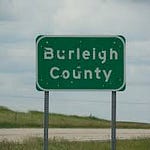Earlier this week, I wrote about what the two main property tax reform bills (so far) are looking to do:
The clear sticking point on any of these plans is the willingness (or lack thereof) to restrict local government taxing and spending power with a “cap”. In my analysis of Governor Armstrong’s plan, I explained that without the “cap” the plan to create a “path to zero” falls apart.
Other commentators, such as Rob Port, are also reiterating this fact:
But the linchpin to that plan, as I mentioned when I first wrote about the plan, is the cap. Under the plan, local governments would be able to grow their budgets by no more than 3% in a given year, though they would be able to bank unused portions of the cap for up to five years.
Would it surprise you to learn that local government officials and their lobbyists like all of Armstrong's plan except for the caps? That became clear when House Bill 1176 (legislation introduced by Rep. Mike Nathe of Bismarck that carries Armstrong's plan) got a hearing before the House Finance and Taxation Committee.
[…]
If lawmakers nix the spending cap, all the tax credits amount to is a massive transfer of revenues from the state government to the local government. Would that lower property taxes (or, at least, slow their growth) in the short term? Probably. But lawmakers have tried to implement property tax relief by sending billions of revenues to local government over the last five biennia. That has not resulted in lower property taxes for most North Dakotans, as evidenced by the fact that we're still debating property taxes.
A Hybrid Model That Also Fast-Tracks Benefit To Primary Residence Homeowners
As I wrote the day after Governor Armstrong outlined his plan for property tax reform, it is simply too slow - a fact that was admitted by the sponsor of the bill during the committee hearing. (This topic also came up this week on the KFYR Kafe - listen above).
The Louser approach to having the state cover K-12 education entirely could be applied to only the primary residences first, instead of the proposed tax cred, then phased into the other property classes. This would give primary residence taxpayers all of their relief up front, without pushing the plan to a billion dollar price tag in the first year.
Here’s how that would be done within the legislative process:
Use the Governor's plan (Nathe's bill) as the vehicle.
Front-load the primary residence benefit by melding Lousers' K-12 "buy-out" ONLY for primary residence. This way the primary residences get ALL the benefit up front.
Develop the phase-in plan for the out years (beyond Year 2), and perhaps even have the legislature put a constitutional amendment on the ballot to guide their planning and to "tie the hands of future legislators”).
Use the next 2 years to get down to the nuts and bolts AFTER the primary residences have gotten theirs up front, including the development of the “cap” program.
The upside of this approach is that it would not hinge on the legislature’s willingness to “cap” local revenue and spending - at least to start.
If the legislature is serious about reforming property taxes, part of the process should be to ask the voters to truly make it a permanent change.
Binding The Legislature’s Hands In The Future
When Representative Nathe spoke on HB 1176, he repeated the line that this legislature cannot ensure the plan will actually happen beyond the first two years.
This is true, but there is a solution: place a constitutional measure on the ballot asking the people to bind the legislature to follow-through on whatever plan the come up with.
If the public is going to take the legislature seriously on property tax reform, they should be given the ability to give their stamp of approve and give the legislature the tools needed to make sure it actually happens. The legislature will need to ask the voters to be given those tools as part of the process.
Regular Updates On BEK-TV
This session, I will be joining Gary Emineth on a more-regular basis on his BEK-TV show to give updates about the session. Here is the first of such updates:
















Share this post